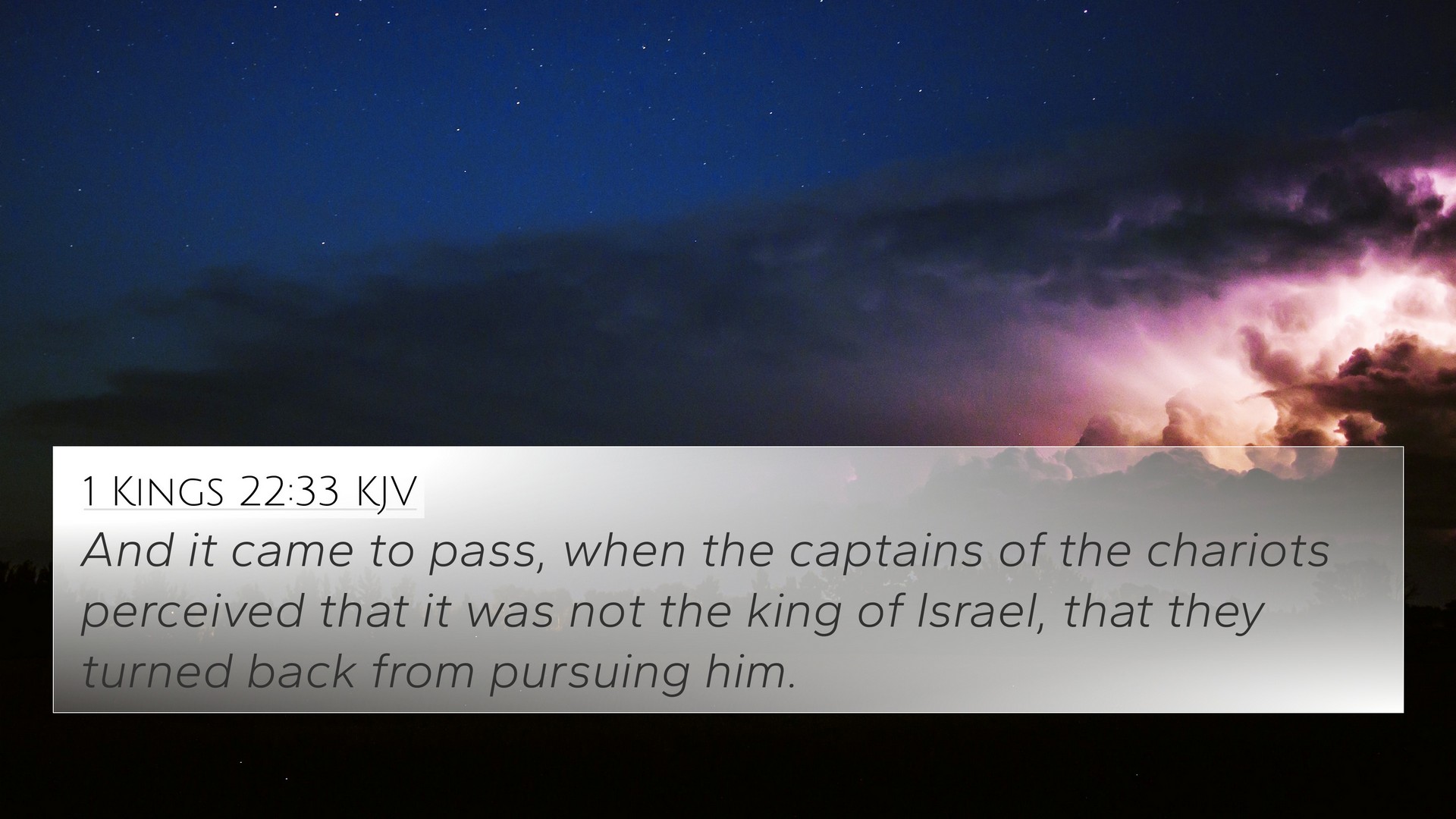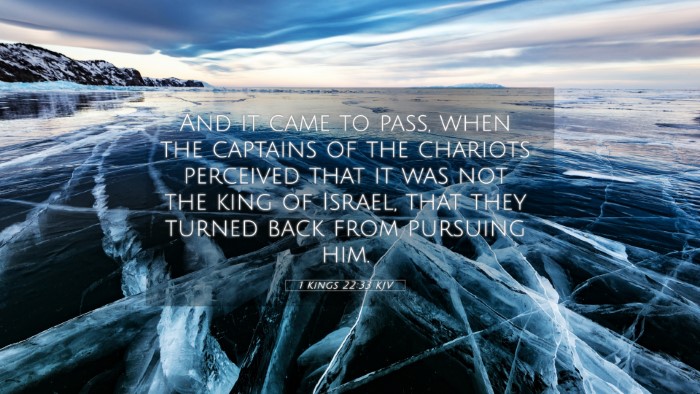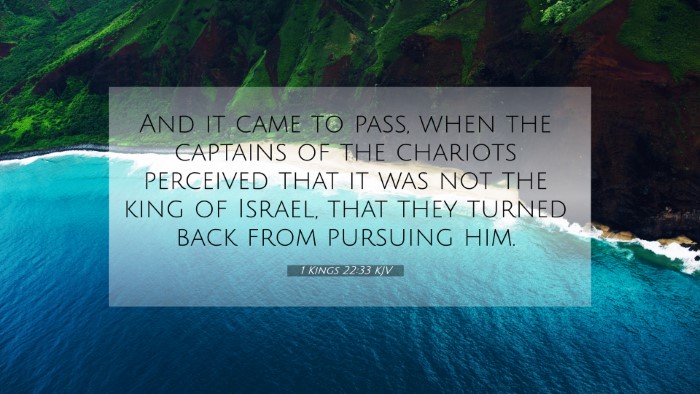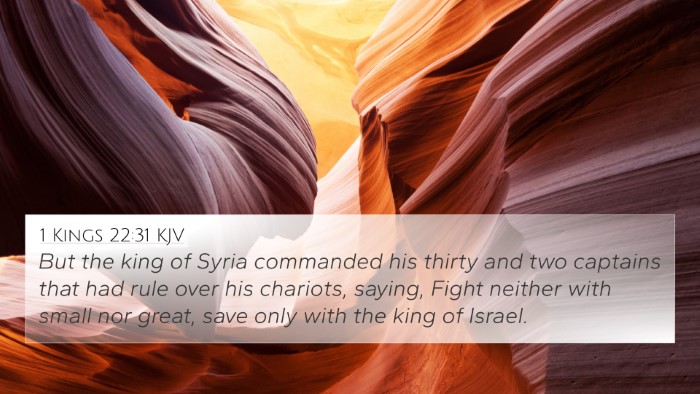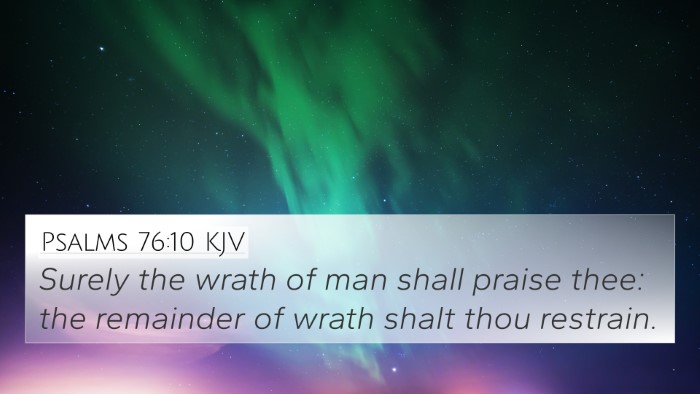Understanding 1 Kings 22:33
Bible Verse: 1 Kings 22:33 - "And Jehoshaphat said, 'Is there not here a prophet of the LORD besides, that we might inquire of him?'"
This verse takes place in the context of a significant moment in the narrative of the kings of Israel and Judah, showcasing the complexities of seeking divine counsel. Here, Jehoshaphat expresses concern over the counsel being offered to King Ahab, indicating a desire for a more reliable prophetic voice. This reflects the broader themes of trust in God, the importance of discerning true prophets, and the quest for divine guidance.
Commentary Insights
Matthew Henry's Commentary: Henry emphasizes the importance of seeking God's direction through a true prophet. He notes that Jehoshaphat's question reveals his understanding of the necessity of God's wisdom in decision-making. Ahab's prophets, though numerous, were not genuine, and Jehoshaphat's initiative to seek a genuine voice indicates a spiritual sensitivity that contrasts with Ahab's reliance on false prophets.
Albert Barnes' Notes: Barnes examines how Jehoshaphat serves as a foil to Ahab by epitomizing righteousness and a desire for God's favor. The verse underscores Jehoshaphat's responsibility as a king to seek godly counsel, and his inquiry suggests an awareness of the moral implications of the decisions being deliberated. He reminds readers that it is vital to inquire of God to avoid making choices based on misleading advice.
Adam Clarke's Commentary: Clarke focuses on the significance of prophetic integrity. He observes that Jehoshaphat demonstrates discernment by questioning the appropriateness of the prophecies presented before him. By seeking another prophet, he advocates for a deeper understanding and obedience to God's will, emphasizing the reality that prophetic truth may at times be difficult to discern amidst competing voices.
Thematic Connections
This verse raises significant questions about the nature of prophetic guidance and the responsibility of leaders to seek truth. Below, we explore important themes and corresponding cross-references:
- The Accountability of Leadership: James 3:1. This verse highlights that leaders face greater scrutiny for their decisions. Jehoshaphat's inquiry reflects a king's duty to seek divine wisdom, aligning with the teachings in James about the seriousness of teaching and leading others.
- The Nature of True Prophecy: Jeremiah 14:14. In this passage, God reveals the distinction between true prophets and those who falsely claim His message, paralleling Jehoshaphat's discernment in seeking a legitimate prophet of the LORD.
- Importance of Divine Counsel: Proverbs 15:22. "Without counsel plans fail, but with many advisers, they succeed." This verse resonates with Jehoshaphat’s actions, affirming the value of seeking sound guidance in turbulent times.
- Concern for Divine Will: Matthew 7:15. Jesus cautions about false prophets, highlighting the continuous need for vigilance in recognizing true spiritual guidance, reflecting Jehoshaphat's concern for God’s truth over popular opinion.
- Righteous Seeking of God's Will: Psalm 36:9. "For with You is the fountain of life; in Your light we see light." This psalm emphasizes the need for divine illumination in our decision-making, akin to Jehoshaphat's desire for godly counsel in his leadership.
- Intercessory Prayer: 1 Thessalonians 5:17. This verse on praying without ceasing echoes the active pursuit of God’s guidance Jehoshaphat embodied through his desire for a prophet of the LORD.
- Seeking the Lord: Isaiah 55:6. "Seek the LORD while He may be found; call upon Him while He is near." This encapsulates the urgency of seeking God, reflective of Jehoshaphat's proactive approach.
Tools for Cross-Referencing
For an in-depth study of verses and their connections, several tools and methods can enhance understanding, including:
- Bible Concordance: A helpful resource to locate keywords and themes across scriptures.
- Bible Cross-Reference Guide: Provides a systematic way to identify related verses.
- Cross-Reference Bible Study: Following the connections between verses to expand understanding of themes.
- Bible Chain References: Link individual verses to a chain of related passages.
- Comprehensive Bible Cross-Reference Materials: Collections that organize verses by themes, facilitating deeper study.
Conclusion
1 Kings 22:33 serves as a vital reminder of the importance of seeking true prophetic counsel in our lives. Through the insights from commentaries, we grasp the value of discernment in spiritual leadership, the necessity of divine guidance in decision-making, and the profound interconnectedness of scripture. Not only does this enrich our understanding of Jehoshaphat’s role, but it also encourages us to actively seek God’s wisdom and truth in our own lives.
